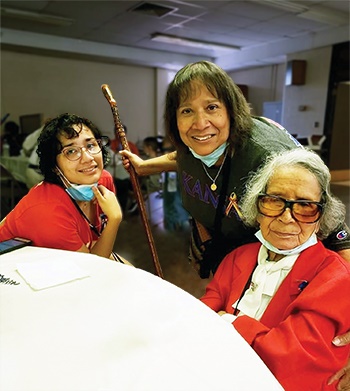Acute Myeloid Leukemia Survivor
Something To Live For
 Lucy Torres Santoyo’s experience with cancer has everything you’d find in a drama on the big screen: surprise, hope, devastation, suspense, love and inspiration. Even a miracle. Today, she feels good — almost 100 percent. And she’s happy because she knows there is life after cancer.
Lucy Torres Santoyo’s experience with cancer has everything you’d find in a drama on the big screen: surprise, hope, devastation, suspense, love and inspiration. Even a miracle. Today, she feels good — almost 100 percent. And she’s happy because she knows there is life after cancer.
As the boss in a very stressful food service job, I was wiped out and having a hard time concentrating. I had flu symptoms, and if I wasn’t moving, I was sleeping. When I got a hard sore on my cheek that was different than a bug bite, I saw my doctor. Even though it was flu season and the hospital was full, my doctor found a bed for me, treated my fever with antibiotics and, for some reason, did a bone marrow test. He then transferred me to a local university teaching hospital where I was diagnosed with acute myeloid leukemia (AML). I was 58 years old.
I was kept in the hospital because my symptoms continued to worsen, and the sore on my cheek developed into a big lesion. I met with an oncologist who suggested a clinical trial made up of blood draws and pills. I was all for it. I could avoid chemotherapy, and I hoped I could make a difference for future cancer patients. Two weeks in, the cancer wasn’t responding at all so I was taken off the trial. Good news, though, there was another trial and another chance to help others through research. But that was unsuccessful, so we went back to the drawing board. Next was inpatient chemotherapy via a port in preparation for a stem cell transplant.
The chemotherapy made me sick, and seeing other patients who were sick was difficult. My daughter is an artist, and she posted her artwork on my walls to cheer me up. I also used that time to get even closer to God. Along with God, my 85-year old blind mother was my biggest source of strength. My goal was to get home to take care of her. Having something to live for helped me through that rough time.
With four brothers and four sisters, you’d think one of them would be a match for the stem cell transplant, but no! My doctor was able to find an unrelated match and, after 40 days, I was released from the hospital. I had the transplant on July 19, 2016, my new birthday. I was amazed it was just an IV. I expected it to be a much bigger process, but I guess the donor has the hard part.
The transplant was successful, and I am in remission. I did develop Graft-versus-Host Disease, a common transplant side effect. My doctor suggested a clinical trial but, unfortunately, it wasn’t the right solution for me. We tried a different medicine that did help.
At this point, the fatigue was horrid. It was too easy to stay home and feel sorry for myself. I credit my mom with getting me out of the house. She is a believer in exercise, so we went to her senior center to exercise, take classes and learn about nutrition.
In 2017, my immune system was still very new, and even though I took all the right precautions, I was hospitalized for the flu. Two weeks later, I got it again. Stubborn me, I didn’t want to go to the doctor because every time I did, I ended up hospitalized. I waited too long and was rushed to the hospital on February 24. I was so sick with pneumonia that they put me into a coma. I didn’t wake up as expected and, finally, on April 2, the doctors told my husband to bring in my family to pray for me and say their goodbyes. That night, I woke up. It was a miracle!
I saw the date on the white board in my hospital room and immediately thought, “I missed Mardi Gras and St. Patrick’s Day!” I was also shocked when I realized I couldn’t walk. I’d lost all my muscle mass. I couldn’t even brush my teeth. I spent a month in rehab. After a lot of hard work in physical therapy and occupational therapy, I moved from using a wheelchair to a cane.
Along with making sure I had everything I needed all the time, my wonderful husband came to the hospital every day and paid $3 to park each time. Those things add up. Asking for help was hard because my friends all have their own lives. But I learned to, and it helped us all. They organized a taco dinner to help pay bills. It brought in $6,000! I’m also very thankful for the hospital social worker. She coordinated disability, COBRA so I wouldn’t lose my insurance and Social Security. I never would have thought of all that.
It was hard to accept my diagnosis but, once I did, I realized there is life after cancer. My advice is to live day by day and try not to think about it. Exercise, eat right and keep your mind going. Find a prayer group. Those things do make a difference. Try to be happy, but don’t underestimate the power of a good cry.


